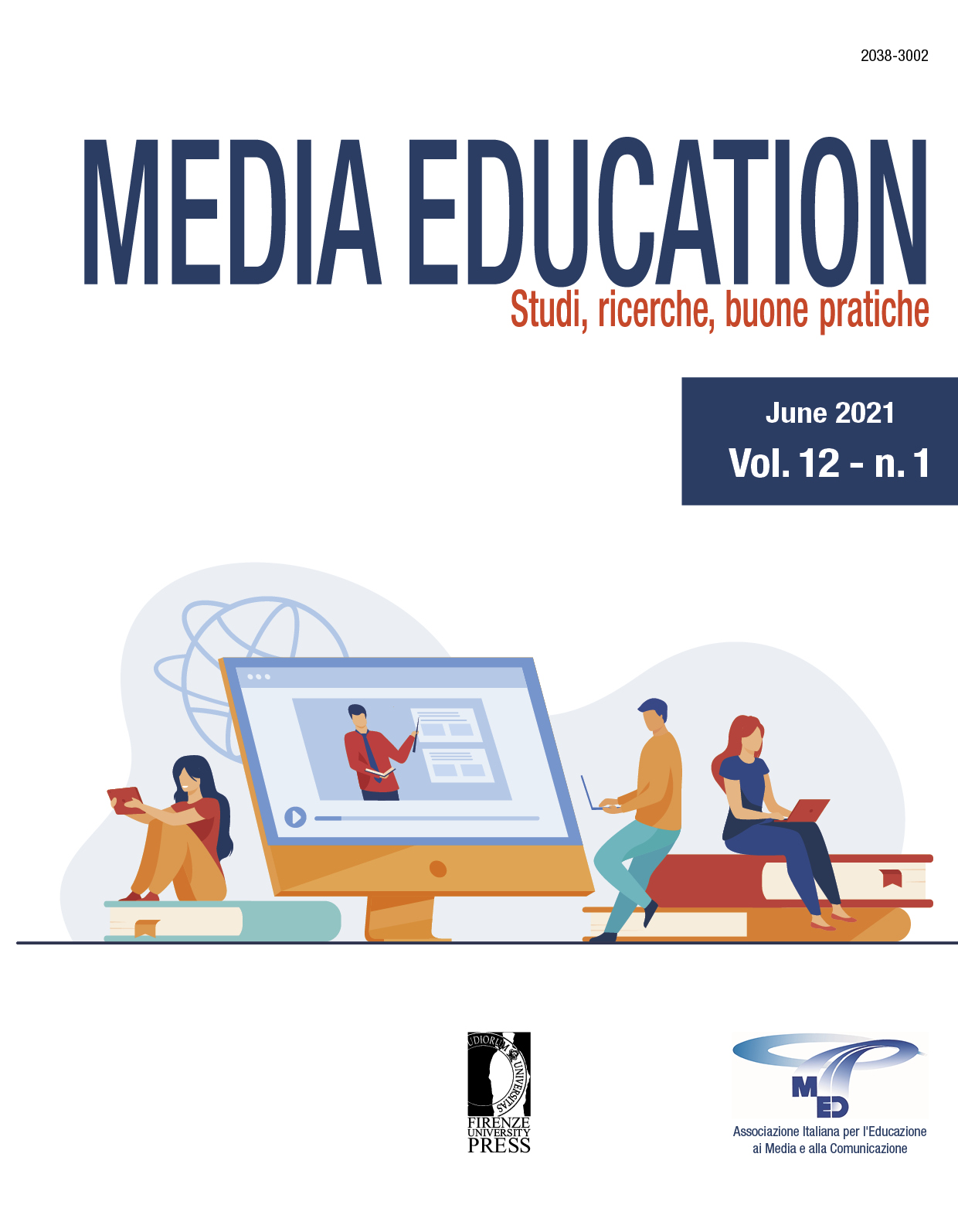Published 2021-05-03
Keywords
- Capability Approach,
- citizenship,
- DigComp,
- digital skills,
- inclusive education
Abstract
The present work focuses on the construct of digital citizenship from an educational and inclusive point of view. Considering the general European interest in implementing citizens’ digital skills and with particular care for the contemporary situation of overall emergency, due to the Covid 19 pandemic case, the idea is that of considering a possible conceptual link between digital skills and the Capability Approach. In the light of an ‘Education for all’, the aware development of teachers and, particularly support teachers’ digital skills, may be a crucial key to enact inclusive processes able to guarantee any pupil and student the chance to become a capable and valuable citizen, despite his/her frailties and social failures. This paper is part of a wider research project entitled “Best practices and tools of analysis in schools and community contexts: learning, teaching & inclusion”, started in March 2019 and funded by the Department of Psychological, Pedagogical Sciences, Physical Exercise and Training, of the University of Palermo, and of which just a segment related to the analysis of support teachers’ digital competence is reported here.
References
Biggeri, M., & Bellanca, N. (2010). Dalla relazione di cura alla relazione di prossimità: l'approccio delle capability alle persone con disabilità. Dalla relazione di cura alla relazione di prossimità, 7-200.
Campa, S. (2019). Le competenze di cittadinanza digitale. Quadri di riferimento, lessico e risorse. Idee in form@zione, 147-168.
Carretero, S., Vuorikari, R., Punie, Y. (2017). DigComp 2.1 Il quadro di riferimento per le competenze digitali dei cittadini Con otto livelli di padronanza ed esempi di utilizzo.
Ellerani, P. (2013). Gli scenari educativi e formativi internazionali in mutamento: contesti cooperativi e capability approach. Formazione e Insegnamento, XI, 4, 17-31.
Kuklis, W. (2005). Amartya Sen’s Capability Approach. Theoretical insights and empirical application. NY-London: Springer.
Lupac, P., (2018). Beyond the digital divide. Contextualizing the information society. Bingley: Emerald Publishing.
Mitra, S. (2006). The capability approach and disability. Journal of disability policy studies, 16(4), 236-247.
Nussbaum, M. (2020). La tradizione cosmopolita. Un ideale nobile ma imperfetto, Milano: Bocconi Editore.
Nussbaum, M. (2012). Creare capacità. Bologna: Il Mulino.
Nussbaum, M. (2002). Capabilities and social justice. International Studies Review, 4(2), 123-135.
Otto, H.U., Ziegler, H. (2006). Education and capabilities. SW & S, 4-2, 269-287.
Saito, M. (2003). Amartya Sen’s Capability approach to Education: A critical exploration. Journal of Philosophy of Education, 1, 17-33.
Sen, A. (2000). Lo sviluppo è libertà. Perché non c’è crescita senza democrazia. Milano: Mondadori.
Sen, A. (1998). Mortality as an Indicator of Economic Success and Failure. The Economic Journal, 108 (446), 1-25.
Sen, A. (2001). Economic development and capability expansion in historical perspective. Pacific Economic Review, 6(2), 179-191.
Sen A. (2003). Development as Capability Expansion. In S. Fukuda-Parr et Alii. Readings in Human Development. New Delhi and New York: Oxford University Press.
Sennett, R. (2012). Together: The rituals, pleasures and politics of cooperation. Yale: University Press.
Stoecklin, D., Bonvin, J.M., (2014). Children’s Rights and the Capability Approach. Challenges and Prospects. NY-London: Springer.
Urbani, C. (2016). La capacitazione dello sviluppo professionale docente: oltre il valore della competenza. Tesi di dottorato, Università Ca Foscari, Venezia.
European Commission (2008). Digital Literacy European Commission working paper and recommendations from Digital Literacy High-Level Expert Group. Brussels, Belgium: Author. Retrieved from http://www.ifap.ru/library/book386.pdf.

